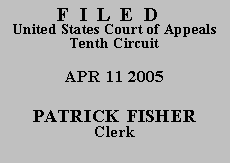

|
DAVID O. McMAHAN,
v.
BOB WILDER, County Sheriff;
LINDA VOYLES, Jail Administrator |
|
Before BRISCOE, LUCERO, and MURPHY, Circuit Judges.
David O. McMahan appeals from the district court's grant of summary judgment in favor of the defendants on McMahan's 42 U.S.C. § 1983 civil rights complaint. In his complaint, McMahan asserted that defendants subjected him to cruel and unusual punishment when they placed him in a jail cell with an inmate known to be infected with Hepatitis C.(1) In a thorough order granting summary judgment to the defendants, the district court first set out the standard governing conditions-of-confinement claims from Farmer v. Brennan, 511 U.S. 825 (1994). Applying that standard, the district court concluded that McMahan had failed to demonstrate he was incarcerated under conditions that posed a substantial risk of harm. In particular, the district court noted the record demonstrated that Hepatitis C is not spread through airborne transmission or casual contact, but is instead spread only through an exchange of bodily fluids. Here, the record was devoid of any evidence that McMahan's infected cellmate had a history of violent or risky behavior that would increase the likelihood of transmission to other inmates. In fact, McMahan had not alleged any instances where he had come into contact with his cellmate's bodily fluids. Because McMahan failed to come forward with any evidence that the defendants disregarded an excessive risk to his health, the district court concluded the defendants were entitled to summary judgment.
This court has reviewed de novo(2) the parties' briefs and contentions, the district court's order, and the entire record on appeal. That review demonstrates no reversible error. Accordingly, the district court is affirmed for substantially those reasons set out in its order dated October 20, 2004.
AFFIRMED.
ENTERED FOR THE COURT
Michael R. Murphy
Circuit Judge
*. This order and judgment is not binding precedent, except under the doctrines of law of the case, res judicata and collateral estoppel. The court generally disfavors the citation of orders and judgments; nevertheless, an order and judgment may be cited under the terms and conditions of 10th Cir. R. 36.3.
1.It appears that McMahan was a pretrial detainee at the time of the events giving rise to his civil rights complaint. As noted by the district court, however, the Eighth Amendment standard serves as the analytical benchmark for such claims. See McClendon v. City of Albuquerque, 79 F.3d 1014, 1022 (10th Cir. 1996).
2.This court reviews a grant of summary judgment de novo, applying the same standards employed by the district court. Byers v. City of Albuquerque, 150 F.3d 1271, 1274 (10th Cir. 1998). Summary judgment is appropriate "if the pleadings, depositions, answers to interrogatories, and admissions on file, together with the affidavits, if any, show that there is no genuine issue of material fact and that the moving party is entitled to judgment as a matter of law." Fed. R. Civ. P. 56(c). The factual record and reasonable inferences therefrom are viewed in the light most favorable to the party opposing summary judgment. Concrete Works of Colo., Inc., v. City & County of Denver, 36 F.3d 1513, 1517 (10th Cir. 1994). Although a pro se plaintiff's pleadings are construed liberally and held to a less stringent standard than pleadings drafted by lawyers, McMahan must nevertheless set forth sufficient facts to support his claims. Hall v. Bellmon, 935 F.2d 1106, 1110-12 (10th Cir. 1991).